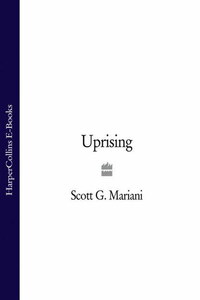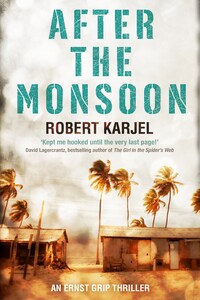Friday 19th July, Cotonou Port.
The thirty-five-ton Titan truck hissed and rocked on its suspension as it came to a halt. Shoulders hunched, it gave a dead-eyed stare over the line of scrimmage which was the chain across the opening of the port gates. On the wood panelling behind the cab were two hand-painted film posters of big men holding guns – Chuck Norris, Sly Stallone – the bandana boys. He handed down his papers to the customs officer who took them into the gatehouse and checked them off. Excitement rippled through the rollicking crowd of whippet-thin men and boys who’d gathered outside the gates in the afternoon’s trampling heat, which stank of the sea and diesel and rank sweat.
The Titan was loaded with bales of second-hand clothes tied down on to the flat-bed of the truck by inch-thick hemp rope. The driver, faceless behind his visor, kicked up the engine which blatted black fumes from a four-inch-wide pipe, ballooning a passing policeman’s shirt. A squeal of anticipation shimmered through the crowd.
Six men, armed with wooden batons the thickness of pickaxe handles, climbed on to the edges of the flat-bed, three a side. Each of them twisted a wrist around a rope and hung off, twitching their cudgels through the thick air. The crowd positioned themselves along the thirty metres of road from the gates to the junction with Boulevard de la Marina. The officer came out with the papers and handed them back up to the driver. He nodded to the man on chain duty who looked at the crowd outside and grinned.
The huge truck farted up some more and lurched as the driver thumped it into gear. He taunted the crowd with his air brakes. They giggled, high-pitched, nearly mad. The chain dropped and the battered, grinning face of the Titan dipped and surged across the line. The men hanging off the back roared and slashed with their batons. The truck picked up some momentum, the cab through the gates now, and the crowd threw themselves at the wall of bales, clawing at the clothes packed tight as scrap metal. The batons connected. Men and boys fell stunned as insects, one was dragged along by the leg of a pair of jeans he’d torn from a bale until a sharp crack on the wrist dropped him. The Titan snarled into second gear.
I saw the boy coming from some way off. He was dressed in a white shirt, a pair of long white shorts and flip-flops. He turned the corner off Boulevard de la Marina up to the port gates and was swallowed up by the mêlée who were now running at a sprint. A baton arced down into the pack and caught the boy on the back of the head. He fell forward, bounced off the hip of some muscled brute who held the reins of a nylon pink nightie stretched to nine feet, and disappeared under the wheels of the Titan.
The crowd roared, and the section around where the boy had fallen collapsed to the ground. The truck pulled away, crashing through the gears. It didn’t stop for the Boulevard de la Marina. The driver stood on his horn. Cars and mopeds squirmed across the tarmac. The men riding shotgun stopped swinging their batons and hung on with both hands. The Titan let out a final triumphant blat of exhaust and headed into town.
I got out of my Peugeot and ran across to where the boy had gone down. People came from all angles. Closer, I could see his arm, the white bone of his arm and the blood soaking into the sleeve and up the chest of his shirt. Some of the hoodlums around him were smeared with his blood, four of them upped and ran. The rest were staring down at the mash of flesh and bone and the thick red ooze on the road. Then the boy was picked up and borne away, his crushed arm hanging like a rag, his head thrown back, eyes rolled to white. Three men ran him down to the main road and threw him into a car which took off in the direction of the hospital. Then they stood and looked at his blood on their shirts.
I was called back to my car which was waiting to get into the port. Horns blared. Arms whirled.
‘M. Medway, M. Medway. Entrez, entrez! Main-te-nant. Main-te-nant.’
I drove in, threading through the line of trucks waiting to get out, past a pile of spaghetti steel wire just beginning to brown with rust. It was five o’clock in the afternoon. I took a small towel from the passenger seat and wiped away the tears of sweat streaming down my face.
I was heading for a ship called the Kluezbork II, Polish flag, 15,000 tons deadweight. Bagado, my ex-partner in M & B ‘Investigations and Debt Collection’ and now back in the Cotonou force in his old job as a detective, was waiting for me on board. He had a problem, a five-men-dead problem. But it wasn’t as big as the captain’s problem which was five men dead on









